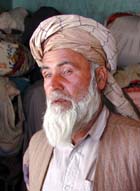Andrew
Maykuth Online
|
 |
|
Khush Rung stands in his house amid his belongings, all packed in case he needs to flee. |
WOOD
KHIL, Afghanistan - Khush Rung packed his household goods two months ago
in the event anarchy broke out in this village near Kabul and he needed to
make a quick escape.
He
stayed put after the U.S. bombing began Oct. 7 and shattered the windows
of his house. And he stayed put on Tuesday, after anti-Taliban forces
entered Kabul and 10 of his neighbors panicked and moved their belongings
out of town.
Yesterday,
the day after the Taliban fled the capital and the Northern Alliance
troops poured in, there was still no sign that Rung was ready to depart.
Then
again, the ethnic Pashtun local leader was not so confident of the new
regime to unpack the bundles he stacked up in his maid's room in case of a
quick getaway.
"A
lot of people are ready to leave this town," Rung, 55, said
yesterday. "But the situation is quiet now and everything is
OK."
Rung's
suspicious acceptance of the Northern Alliance was typical of the wariness
in Kabul yesterday as the group, also known as the United Front, settled
in as Afghanistan's de facto government and the Taliban, hammered by a
relentless American air assault, rapidly gave up control even in cities
such as Jalalabad and - while its fall remains unconfirmed - Kandahar,
where it once had unquestioned power.
Northern
Alliance leaders moved back into ministries they were forced to vacate in
1996 when the Taliban entered Kabul. And a sense of calm and order
returned to a city that has undergone several fearful stampedes for the
exits in recent months.
Shoppers
yesterday returned to Kabul's markets, which were locked up and empty the
day before in anticipation that the arrival of the Northern Alliance would
set off an ethnic bloodbath.
"It
was my best day in two months since the terrorist attacks in the United
States," said Haji Amin Allah, a seller of rice, beans, flour and
household goods. His sales nearly tripled to $150 yesterday, which he
attributed to consumer confidence.
The
gray-uniformed police and camouflaged soldiers who guarded government
compounds and inspected vehicles at roadblocks also seemed on their best
behavior. There were no reports of looting, either by opportunists or the
soldiers. There were no indiscriminate acts of ethnic hatred attributed to
the Northern Alliance troops dominated by minority groups from the north,
primarily Tajiks and Uzbeks.
Worried
about reports of executions of militant foreign troops who supported the
Islamic regime during Monday's lightning offensive against Kabul, the
Northern Alliance urged Afghan groups to meet quickly to form a
transitional government backed by an international force.
But
Northern Alliance chieftains seemed to be slowly gaining more confidence
about their roles as leaders of the new government. Abdullah, the Northern
Alliance foreign minister, urged Afghan groups to meet in Kabul rather
than a foreign country to "negotiate" a transitional government.
But he also indicated the Northern Alliance had a much stronger hand to
play now that it controlled Kabul.
"There
is a totally new situation in Afghanistan," he said Tuesday. The
Northern Alliance's rapid conquest demanded "a new evaluation of the
situation," he said.
But
memories are long in this city built on a small plain surrounded by
dramatic jagged mountains. Many residents recall the chaos that
accompanied the Northern Alliance's first attempt at governing Afghanistan
nine years ago.
Following
the 13 years of war to oust a Soviet occupation force and Afghanistan's
communist government, the Islamic warriors known as mujaheddin ushered in
an era of disorganization and bickering after their conquest of Kabul in
1992. When rivals failed to arrange a provisional government, factional
fighting caused thousands of civilian casualties as Kabul was showered
with rockets.
The
Taliban, which developed as a home-grown Pashtun religious militia force
in reaction to marauding mujaheddin squads, pushed the government of
President Burnahuddin Rabbani out of Kabul in 1996. Initially it was
regarded as a stabilizing force.
Now
the Northern Alliance may get a second chance to govern. Though guerrilla
leaders said they want to develop a broad-based government encompassing
all ethnic groups, the Northern Alliance is still regarded with deep
suspicion by many Pashtuns, the country's dominant ethnic group.
"The
people will not accept the Northern Alliance," said Dad Mohammed
Bahir Abdullah, the acting country director of Care International in
Kabul. "They have a very bad memory of 1992."
Abdullah,
a Pashtun, acknowledged the Northern Alliance entered Kabul on Tuesday in
a much more orderly and disciplined manner than in 1992, with military and
police units assuming preassigned posts around the city.
And
though he had been worried that the Northern Alliance would break its
promise and send troops into the capital, Abdullah said it was not such a
bad idea because anarchy was reigning in the political vacuum that
occurred after the Taliban fled Kabul early Tuesday.
"It
was good they came into Kabul," he said. "But looking into the
future, it will be hard to get them out."
Khush
Rung is also wary of allowing the military into Kabul, where he does not
want a return to a situation where different armed factions controlled
various parts of the capital. The Taliban was little better.
"The Taliban was not a good government for Afghanistan," said Rung, who, like many Afghans, would prefer for power to be handed over to a U.N.-arranged force. "We're just waiting for the new government to bring peace for Afghanistan, that doesn't rule in favor of one ethnic group such as Tajik and Pashtun."